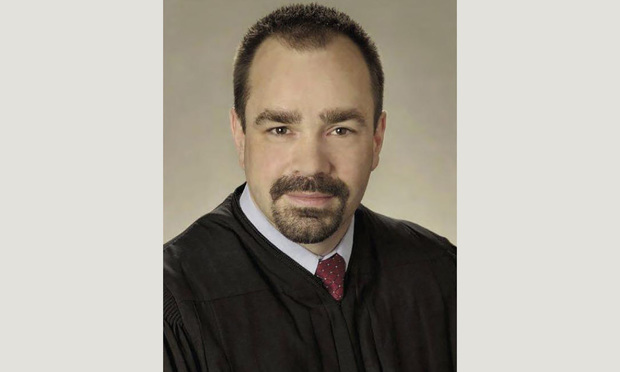$213K Fee Award Remanded, $100K in Punitives Upheld, in Homeowners' Suit Over Community Assessments
A panel led by Commonwealth Court Judge P. Kevin Brobson sent the case back for recalculation of the fees, deducting the cost of certain procedural arguments in which the developer was successful, but didn't disturb the finding below of vexatious litigation conduct by the developer.
July 11, 2019 at 02:27 PM
4 minute read
 Commonwealth Court Judge P. Kevin Brobson.
Commonwealth Court Judge P. Kevin Brobson.
William and Bette Ann Belleville, who believe their developer and homeowners association in Chester County overcharged them by $200 a year for five years starting in 2001, have been in court since 2008 trying to get back that $1,000. Except now the amount of money on the table has grown considerably.
The Commonwealth Court has upheld a lower court's grant of $100,000 in punitive damages to be paid to the Bellevilles by developer David Cutler Group Inc. That's in addition to the original compensatory damages award of $1,000.
The court also vacated the order for Cutler to pay the Bellevilles $212,895 in attorney fees. It's not that Cutler shouldn't pay the fees—it's just that some of the $450-per-hour bills should be removed from the tab, Commonwealth Court Judge P. Kevin Brobson said in a June 28 order.
Brobson, joined by Judges Anne Covey and Christine Fizzano Cannon, sent the case back to trial court for recalculation of the fees, deducting the cost of certain procedural arguments in which Cutler was successful.
“On remand, the trial court is directed to exclude from its award of attorneys' fees any and all attorneys' fees incurred by the Bellevilles in connection with Cutler's successful assertion of any procedural/non-merit based defenses during this litigation, which shall include, but not necessarily be limited to, those attorneys' fees incurred in connection with the Bellevilles' motion for class certification, Cutler's preliminary objections to the Bellevilles' complaint, Cutler's motion to dismiss for failure to join an indispensable party, and the prior appeals to this court,” Brobson said.
Cutler was represented by Richard McBride of the Law Office of Richard McBride in Lower Gwynedd. McBride on Thursday declined to comment on Brobson's ruling.
The Malvern Hunt Homeowners Association was represented by Steven L. Sugarman of Steven L. Sugarman & Associates in Berwyn. Sugarman could not be reached.
The Bellevilles were represented by Andrew Schneider of Silverman Trotman & Schneider in Philadelphia.
Schneider noted Thursday the long-running nature of the dispute—which is still not over.
“It was never about the money. It was about the illegal and secretive filing of community documents,” Schneider said. He called Brobson's ruling “fair and reasonable.”
“The trial court's decision was pretty close to the appellate conclusion,” Schneider said. “The homeowners association got stuck with the short end of the stick because the developer was very unethical, hence the punitive damages and attorney fees.”
Cutler developed the Malvern Hunt planned community with 279 properties divided into three communities: The Reserve, The Chase and The Ridings. The Reserve has 101 minimum-maintenance single-family lots. The Chase has 95 carriage homes. The Ridings has 83 standard single-family units. The Bellevilles bought a home in The Ridings in 2001.
Malvern Hunt Homeowners Association controls and maintains open spaces and amenities, including tennis courts and playgrounds. Membership in the association consists of the 196 lot owners of The Chase and The Reserve. The Bellevilles and the other 82 residents of The Ridings are excluded from membership in the association, and also from maintenance services such as lawn care and snow removal provided to the other two sections, Brobson said.
The Bellevilles contend that the original governing documents required them to pay no annual fee after their initial $1,000 payment upon purchase. But, they allege, without their knowledge, the developer changed the rules illegally and began requiring them to pay 20% of the neighboring homeowners' annual association fee.
Although Brobson is sending the case back to redo the math on the attorney fees, he agreed in general with Chester County Court of Common Pleas Judge Edward Griffith.
Brobson said Section 2503(7) of the Judicial Code allows a trial court to award reasonable attorney fees as a sanction “for dilatory, obdurate or vexatious conduct during the pendency of the matter.” He defined “vexatious conduct” as that which is “without sufficient grounds and serving only to cause annoyance.” He defined “obdurate conduct” as “stubbornly persistent in wrongdoing.”
“Here, the trial court concluded that Cutler's conduct during the pendency of this litigation was obdurate and vexatious because Cutler essentially advanced a frivolous defense to the merits of the Bellevilles' claims,” Brobson said. “Based on our review of the trial court's decision, we find no abuse of discretion with respect to the trial court's conclusion that Cutler's advancement of a frivolous defense on the merits constituted obdurate and vexatious conduct.”
The case is Belleville v. Cutler.
This content has been archived. It is available through our partners, LexisNexis® and Bloomberg Law.
To view this content, please continue to their sites.
Not a Lexis Subscriber?
Subscribe Now
Not a Bloomberg Law Subscriber?
Subscribe Now
NOT FOR REPRINT
© 2025 ALM Global, LLC, All Rights Reserved. Request academic re-use from www.copyright.com. All other uses, submit a request to [email protected]. For more information visit Asset & Logo Licensing.
You Might Like
View All
Commonwealth Court Overturns Zoning Board’s Denial Based on Merger Doctrine and Unnecessary Hardship Questions
9 minute read
K&L Gates Sheds Space, but Will Stay in Flagship Pittsburgh Office After Lease Renewal

Commonwealth Court Overturns Award of Damages Assessed Against Landlord on Claims of Unlawful Discrimination
6 minute read
Trending Stories
- 1Justified Termination Does Not Bar Associate Attorney From Unemployment Benefits, State Appellate Court Rules
- 2Effective Termination Strategies in Today’s Troubled Condo Market
- 3AI and Land Use—a Perfect Match in Real Estate Heaven
- 4New Atlanta Litigation Firm Breaks Away From Swift Currie
- 5Florida Law Schools Are Seeing a Bump in Applications for 2025, After Recent Declines at Flagship Schools
Who Got The Work
J. Brugh Lower of Gibbons has entered an appearance for industrial equipment supplier Devco Corporation in a pending trademark infringement lawsuit. The suit, accusing the defendant of selling knock-off Graco products, was filed Dec. 18 in New Jersey District Court by Rivkin Radler on behalf of Graco Inc. and Graco Minnesota. The case, assigned to U.S. District Judge Zahid N. Quraishi, is 3:24-cv-11294, Graco Inc. et al v. Devco Corporation.
Who Got The Work
Rebecca Maller-Stein and Kent A. Yalowitz of Arnold & Porter Kaye Scholer have entered their appearances for Hanaco Venture Capital and its executives, Lior Prosor and David Frankel, in a pending securities lawsuit. The action, filed on Dec. 24 in New York Southern District Court by Zell, Aron & Co. on behalf of Goldeneye Advisors, accuses the defendants of negligently and fraudulently managing the plaintiff's $1 million investment. The case, assigned to U.S. District Judge Vernon S. Broderick, is 1:24-cv-09918, Goldeneye Advisors, LLC v. Hanaco Venture Capital, Ltd. et al.
Who Got The Work
Attorneys from A&O Shearman has stepped in as defense counsel for Toronto-Dominion Bank and other defendants in a pending securities class action. The suit, filed Dec. 11 in New York Southern District Court by Bleichmar Fonti & Auld, accuses the defendants of concealing the bank's 'pervasive' deficiencies in regards to its compliance with the Bank Secrecy Act and the quality of its anti-money laundering controls. The case, assigned to U.S. District Judge Arun Subramanian, is 1:24-cv-09445, Gonzalez v. The Toronto-Dominion Bank et al.
Who Got The Work
Crown Castle International, a Pennsylvania company providing shared communications infrastructure, has turned to Luke D. Wolf of Gordon Rees Scully Mansukhani to fend off a pending breach-of-contract lawsuit. The court action, filed Nov. 25 in Michigan Eastern District Court by Hooper Hathaway PC on behalf of The Town Residences LLC, accuses Crown Castle of failing to transfer approximately $30,000 in utility payments from T-Mobile in breach of a roof-top lease and assignment agreement. The case, assigned to U.S. District Judge Susan K. Declercq, is 2:24-cv-13131, The Town Residences LLC v. T-Mobile US, Inc. et al.
Who Got The Work
Wilfred P. Coronato and Daniel M. Schwartz of McCarter & English have stepped in as defense counsel to Electrolux Home Products Inc. in a pending product liability lawsuit. The court action, filed Nov. 26 in New York Eastern District Court by Poulos Lopiccolo PC and Nagel Rice LLP on behalf of David Stern, alleges that the defendant's refrigerators’ drawers and shelving repeatedly break and fall apart within months after purchase. The case, assigned to U.S. District Judge Joan M. Azrack, is 2:24-cv-08204, Stern v. Electrolux Home Products, Inc.
Featured Firms
Law Offices of Gary Martin Hays & Associates, P.C.
(470) 294-1674
Law Offices of Mark E. Salomone
(857) 444-6468
Smith & Hassler
(713) 739-1250





